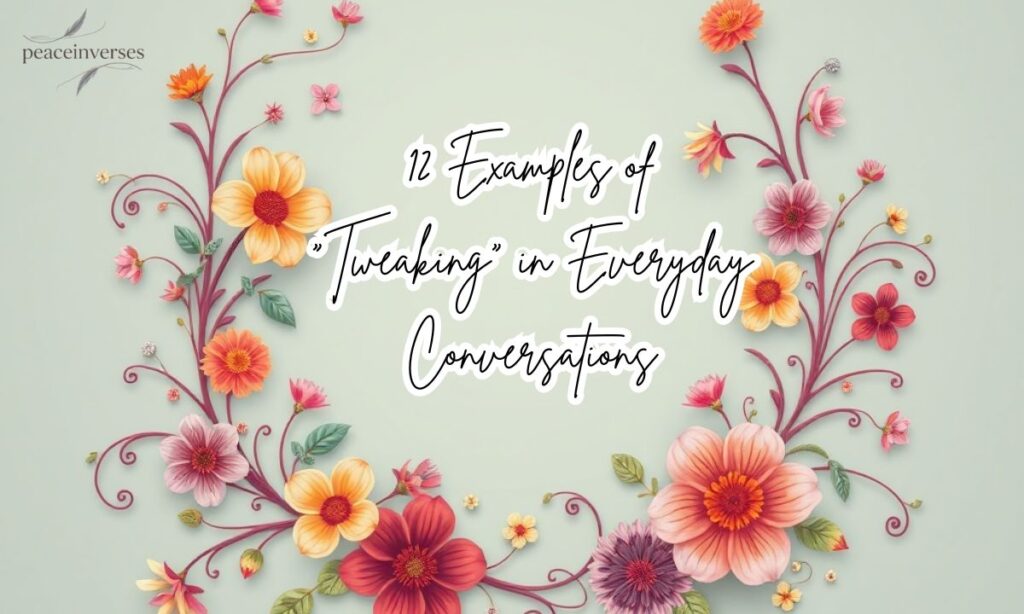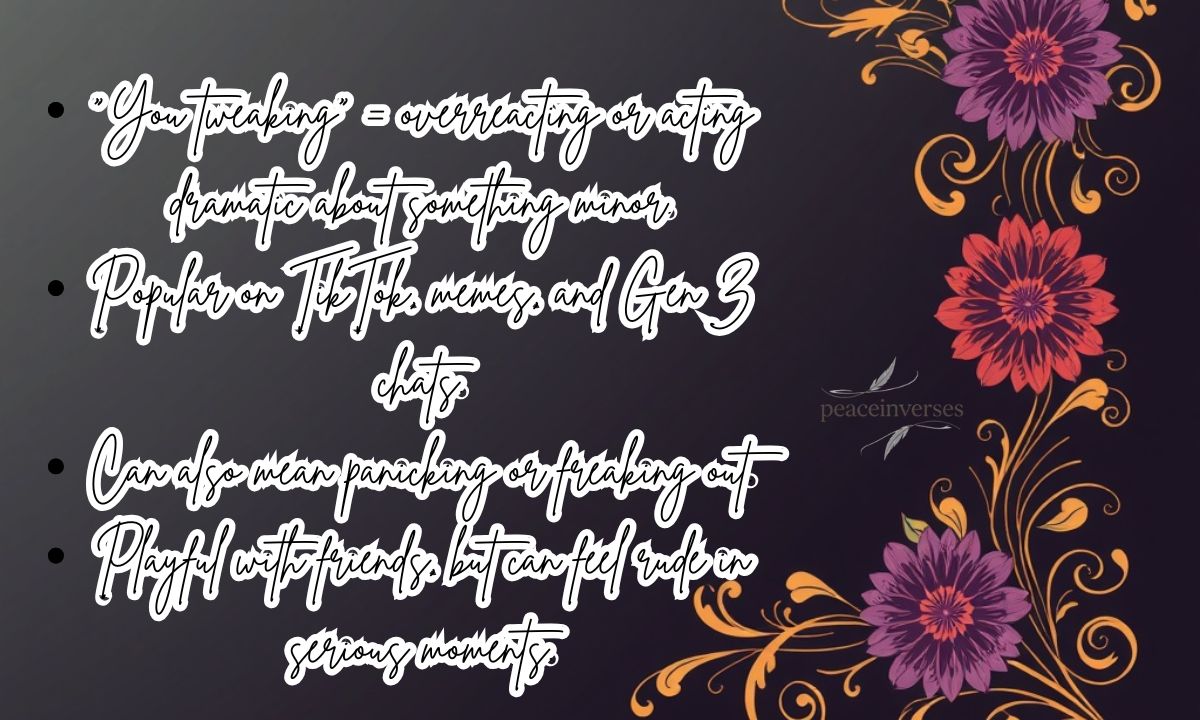Ever seen someone comment “you tweaking” on TikTok or in a text and felt lost? You’re not the only one. This Gen Z slang has taken over memes, chat replies, and viral videos, but its meaning isn’t always obvious.
At its core, “tweaking” means acting dramatic, panicking, or overreacting — often over something small. In 2025, it’s mostly playful slang, but it still carries traces of its older, more serious roots. Understanding the tone and context is key so you can use it (or respond to it) without sounding out of touch.
The Origin & Evolution of “Tweaking” in Slang
“Tweaking” started as a regular English verb meaning to adjust or twist slightly. Over time, it shifted into street slang, especially in the early 2000s. In drug culture, it described paranoia, agitation, and sleepless energy caused by stimulants.
As internet memes and online jokes spread, the word’s tone changed. It moved from describing extreme behavior to calling out overreactions in a playful way. Social media made the slang mainstream, giving it a lighter, often humorous vibe.
Today, the word is a cultural bridge — linking its gritty origins with Gen Z humor. Its flexible nature lets it show up in rap lyrics, gaming chats, and TikTok captions, adapting to each platform’s style.
What Does “Tweaking” Mean in Slang?
In everyday Gen Z conversations, “tweaking” means overreacting, panicking, or acting irrational. It’s often used to tease someone who’s being dramatic about something minor.
It can also describe feeling restless, anxious, or hyperactive. Friends often use it to tell someone to calm down, not as an insult. Tone makes the difference between a joke and offense.
Sometimes, it still refers to making small changes or adjustments — like tweaking a design or photo. This positive meaning shows the word’s versatility in both casual and creative settings.
What “You Tweaking” Means in Texts, Memes & TikTok
When someone texts “you tweaking,” they’re usually saying, “you’re overreacting or acting wild.” It’s often followed by a laughing emoji or playful tone.
On TikTok, captions like “POV: you tweaking at 3 a.m.” highlight funny overthinking moments. Memes use it to exaggerate small dramas for comedic effect.
In group chats or gaming, it’s a quick way to call someone out for being unreasonable or too intense. The slang thrives in spaces where humor and speed matter.
How “Tweaking” Is Used on TikTok & Social Media
TikTok made “tweaking” a trending catchphrase. Creators use it in skits showing funny late-night thoughts, silly fears, or over-the-top reactions.
- POV videos: “You tweaking thinking you left the stove on.”
- Relationship jokes: “Girl, you tweaking, it’s just a dog video.”
- Gaming memes: “Bro, stop tweaking, we’re winning anyway.”
On Twitter/X, Instagram, and YouTube comments, it’s become a reaction word — often paired with GIFs or memes. Its popularity comes from how easily it captures drama in a single phrase.
When “Tweaking” Is Playful vs. Serious
“Tweaking” is playful when friends use it to tease harmless overreactions. It’s part of online humor and light roasting that Gen Z often enjoys.
However, the word turns serious in contexts tied to drug use or mental distress. In those cases, it refers to real agitation or paranoia and shouldn’t be used as a joke.
Knowing the context and the audience matters. Use it casually in memes or chats with friends, but avoid it in sensitive conversations, professional settings, or when someone is genuinely upset.
Gen Z Alternative Slang to “Tweaking” (Like “Crashing Out”)
Gen Z often swaps “tweaking” with other slang that carries similar vibes. These words capture everything from being dramatic to totally losing control. They’re often playful but can sound intense depending on tone.
Many alternatives started in rap culture, gaming, or TikTok trends before becoming common in everyday texting. They let young people express emotions quickly, often in just one word or phrase.
Here are some popular Gen Z alternatives you’ll hear instead of “tweaking”:
- Crashing out: Acting impulsively or self-destructively.
- “Bro really crashed out over a video game.”
- “Bro really crashed out over a video game.”
- Wilding: Acting crazy, carefree, or reckless.
- “She was wilding at the concert last night.”
- “She was wilding at the concert last night.”
- Bugging / Bugging out: Overreacting or panicking.
- “Stop bugging, it’s just homework.”
- “Stop bugging, it’s just homework.”
- Geeking: Laughing uncontrollably or being overly excited.
- “We were geeking at that joke for hours.”
- “We were geeking at that joke for hours.”
- Overhyping: Making something sound bigger or worse than it is.
- “You’re overhyping this party. It’s not that deep.”
- “You’re overhyping this party. It’s not that deep.”
- Tripping: Acting irrational, confused, or exaggerating.
- “He’s tripping about a missed text.”
- “He’s tripping about a missed text.”
- Losing it: Showing extreme emotions or breaking composure.
- “I was losing it when I saw the price of that bag.”
- “I was losing it when I saw the price of that bag.”
These words often overlap with “tweaking,” but context changes how they feel — some are funny, others can sound critical or harsh.
12 Examples of “Tweaking” in Everyday Conversations

These examples show how “tweaking” and its alternatives work in different tones and contexts. Notice how the meaning shifts based on the situation.
1. School Stress – Playful Tone
- “I can’t believe I got a B+, I’m ruined!”
- Reply: “Bro, you’re tweaking. That’s still a great grade.”
- Alternative: “You’re overhyping it, relax.”
2. Gaming Frustration – Teasing Tone
- “Why did you run into the enemy like that?!”
- Reply: “Man, you’re bugging out, it was just a game.”
3. Relationship Drama – Light Roast
- “He liked her post… we’re over.”
- Reply: “Girl, you’re tweaking, it’s just a like.”
- Alternative: “You’re tripping for no reason.”
4. Concert Excitement – Positive Energy
- “I can’t wait for the show tonight!”
- Reply: “We’re all geeking right now.”
5. Late-Night Worries – Meme Tone
- “I think I left the oven on…”
- Reply: “You’re tweaking at 3 a.m. Go back to bed.”
6. Shopping Shock – Amused Tone
- “That jacket costs $800!”
- Reply: “I was losing it when I saw the price too.”
7. Sports Fan Reactions – Excited Tone
- “Did you see that goal?!”
- Reply: “We were all wilding when he scored.”
8. Overthinking Texts – Gentle Tease
- “She hasn’t replied in 10 minutes, she must be mad.”
- Reply: “Stop tweaking, maybe she’s just busy.”
9. Prank Gone Wrong – Shocked Tone
- “He jumped in the pool fully dressed.”
- Reply: “He really crashed out for no reason.”
10. Workplace Panic – Serious Advice
- “We missed the deadline, it’s over for us.”
- Reply: “You’re overhyping it. We can still fix it.”
11. Laughing Fit – Joyful Tone
- “That video was hilarious!”
- Reply: “We were geeking so hard we cried.”
12. Online Comment Section – Casual Roast
- “These fans are arguing again.”
- Reply: “The whole comment section is tweaking right now.”
Is It Offensive to Say “You Tweaking”?
The phrase “you tweaking” isn’t automatically offensive, but it depends on tone, intent, and context. Among friends, it’s often lighthearted and playful.
Problems arise if it’s said during serious situations or to someone who’s genuinely upset. In that case, it can feel dismissive or mocking rather than funny.
Remember, the word still carries traces of its drug-related origins, so some people may find it uncomfortable. Use it carefully with new acquaintances or in sensitive conversations.
How to Reply When Someone Says “You Tweaking”
When someone calls you “tweaking,” your reply can shift the mood. If it’s a joke, you can respond with humor to keep things friendly and light.
Here are a few fun or clever responses:
- “Yeah, tweaking and thriving ✌️.”
- “Nah bro, I’m just passionate.”
- “Okay, maybe I’m tweaking… a little.”
- “You’d tweak too if you knew what I know.”
If the comment feels rude or out of place, a calm and straightforward reply like “I’m not tweaking, I just feel strongly about it” can defuse tension without escalating things.
Tips for Using Slang in a Smart, Contextual Way
Slang like “tweaking” works best when you understand the people and setting you’re speaking to. It should feel natural, not forced or disrespectful.
Follow these guidelines to avoid misunderstandings:
- Know your audience: Stick to slang with friends or peers, skip it in work emails or formal settings.
- Watch the tone: Texts and memes can seem harsher without emojis or context.
- Avoid sensitive moments: Don’t use slang when someone is upset or stressed.
- Stay updated: Slang meanings shift fast; check current usage before trying new words.
Using slang wisely shows you’re aware of context and respectful of boundaries. It keeps conversations fun while preventing awkward or offensive situations.
Frequently Asked Questions
What does “you tweaking” mean?
It means you’re overreacting, panicking, or acting irrationally about something minor.
Is “tweaking” still linked to drugs?
Not usually. Most Gen Z use it playfully, but the word’s roots come from drug-related slang.
Can I use “tweaking” in school or work chats?
It’s better not to. Use neutral words like “overreacting” or “stressing out” in formal settings.
Is it rude to call someone “tweaking”?
It depends on tone. Friendly teasing is fine, but it can feel offensive if someone is upset.
What’s another word I can use instead of “tweaking”?
You can say “tripping,” “bugging out,” “overreacting,” or “losing it,” depending on the mood.
Final Words
“Tweaking” has grown beyond its old roots, becoming a versatile Gen Z phrase for overreacting or acting dramatic. It’s playful in memes and chats but can feel harsh or offensive if used carelessly.
Tone, audience, and timing decide whether it lands as a joke or a jab. Learning when to use it — and when to switch to a softer word — helps you stay relatable without crossing lines. With the right context, slang like “tweaking” keeps conversations lively and authentic.

Muhammad Shoaib is a passionate faith-based writer with over 10 years of experience in creating meaningful content centered around prayers, Bible meanings, scriptural teachings, and heartfelt wishes. He is the lead writer at PeaceInVerses.com, where he shares spiritual insights and uplifting messages to guide and inspire readers on their faith journey.

